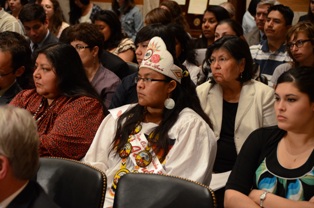Washington D.C. –
U.S. Senator Daniel K. Akaka (D-Hawaii), Chairman of the Senate Committee on Indian Affairs, held an oversight hearing Thursday titled, “Finding Our Way Home: Achieving the Policy Goals of NAGPRA.”
 “How we care for the dead speaks volumes about how we value the living,” said Chairman Akaka. “We must respect indigenous communities by honoring the wishes of their ancestors to make their way home. Our hearing reaffirmed that continued cooperation between federal agencies, museums, and indigenous groups is needed to meet the policy goals of NAGRPA and the spiritual needs of Native communities.”
“How we care for the dead speaks volumes about how we value the living,” said Chairman Akaka. “We must respect indigenous communities by honoring the wishes of their ancestors to make their way home. Our hearing reaffirmed that continued cooperation between federal agencies, museums, and indigenous groups is needed to meet the policy goals of NAGRPA and the spiritual needs of Native communities.”
The hearing reviewed the policy aims of the Native American Graves Protection and Repatriation Act (NAGPRA) and the National Museum of the American Indian (NMAI) Act, focusing on the current federal repatriation process established by those laws. Committee members questioned witnesses from the U.S. Government Accountability Office (GAO), the National Park Service (NPS), the Smithsonian National Museum of the American Indian, the Native American cultural and preservation community, and tribes and organizations on the best practices and challenges in repatriating remains, funerary, sacred and patrimonial objects and how federal agencies and museums have progressed towards achieving NAGPRA goals.
GAO officials cited the U.S. Forest Service, the Army Corps of Engineers, and the National Park Services as the most compliant federal agencies regarding the repatriation laws and credited their success to centralized data and dedicated resources, including staff and funding. Tribal leaders on the witness panel also discussed what additional policy considerations are necessary to make the United States a leader in ensuring burial rights and protections for its indigenous peoples.
The NMAI Act established the National Museum of the American Indian as part of the Smithsonian Institution and prescribed laws and procedures to begin governing repatriation.
 NAGPRA provides a process for museums and Federal agencies to return certain Native American cultural items – human remains, funerary objects, sacred objects, and objects of cultural patrimony – to lineal descendants, Indian tribes, and Native Hawaiian organizations. The Act also establishes the Native American Graves Protection and Repatriation Review Committee to monitor the NAGPRA process and facilitate the resolution of disputes that may arise concerning repatriation under NAGPRA.
NAGPRA provides a process for museums and Federal agencies to return certain Native American cultural items – human remains, funerary objects, sacred objects, and objects of cultural patrimony – to lineal descendants, Indian tribes, and Native Hawaiian organizations. The Act also establishes the Native American Graves Protection and Repatriation Review Committee to monitor the NAGPRA process and facilitate the resolution of disputes that may arise concerning repatriation under NAGPRA.
Since NAGPRA’s enactment in 1990, there have been over 40,000 human remains, 1.1 million funerary objects, 5,500 sacred objects, and 2,100 patrimonial objects found eligible for repatriation by museums and Federal agencies in the United States as a result of the process set out in NAGPRA, according to the National Park Service’s National NAGPRA office.
-END-
Contact: Jesse Broder Van Dyke
Contact Phone: 202-224-7045
Contact E-mail: jesse_brodervandyke@akaka.senate.gov
